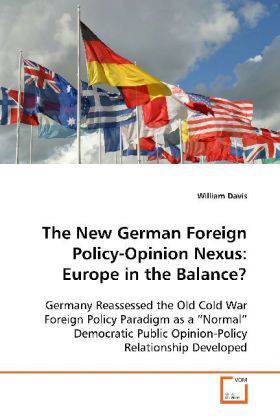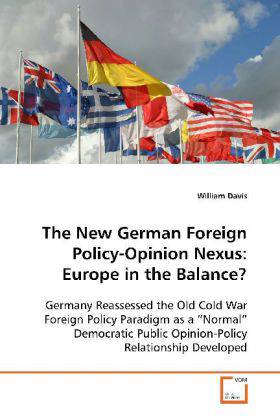
Bedankt voor het vertrouwen het afgelopen jaar! Om jou te bedanken bieden we GRATIS verzending (in België) aan op alles gedurende de hele maand januari.
- Afhalen na 1 uur in een winkel met voorraad
- In januari gratis thuislevering in België
- Ruim aanbod met 7 miljoen producten
Bedankt voor het vertrouwen het afgelopen jaar! Om jou te bedanken bieden we GRATIS verzending (in België) aan op alles gedurende de hele maand januari.
- Afhalen na 1 uur in een winkel met voorraad
- In januari gratis thuislevering in België
- Ruim aanbod met 7 miljoen producten
Zoeken
The New German Foreign Policy-Opinion Nexus: Europein the Balance?
Germany Reassessed the Old Cold War Foreign PolicyParadigm as a "Normal" Democratic PublicOpinion-Policy Relationship Developed
William Davis
Paperback | Engels
€ 63,45
+ 126 punten
Omschrijving
After the end of the Cold War and unification withthe former East German GDR, Germany maintained thepolicy alliance paradigm with the US. However, withthe 2002 opposition to the US on UN Security Councilresolution 1441 on Iraq, this relationship appearedto change. Does the German decision on Iraq indicatea new foreign policy direction and what accounts forthis possible change in Germany? Exogenous andendogenous factors including US policy, EUintegration, Unification/Growing Germanself-assurance, and the opinion-policy relationshiptypical for advanced democratic countries areexamined. Scholars of democracy have suggested thatpolicy outputs follow public opinion in advanceddemocratic countries. Using time-series statisticalregression analyses, I test the opinion-policy nexusin Germany with regard to the US foreign policyrelationship. I find that along with severalcontributing factors, post-unification changes in theGerman electorate allowed for a reassessment of theold foreign policy paradigm as a "normal"opinion-policy relationship developed in post-ColdWar Germany. From a realist's systemic perspectivehowever, German behavior looks a lot like balancing.
Specificaties
Betrokkenen
- Auteur(s):
- Uitgeverij:
Inhoud
- Aantal bladzijden:
- 72
- Taal:
- Engels
Eigenschappen
- Productcode (EAN):
- 9783639090413
- Verschijningsdatum:
- 6/10/2008
- Uitvoering:
- Paperback
- Afmetingen:
- 150 mm x 4 mm
- Gewicht:
- 124 g

Alleen bij Standaard Boekhandel
+ 126 punten op je klantenkaart van Standaard Boekhandel
Beoordelingen
We publiceren alleen reviews die voldoen aan de voorwaarden voor reviews. Bekijk onze voorwaarden voor reviews.









